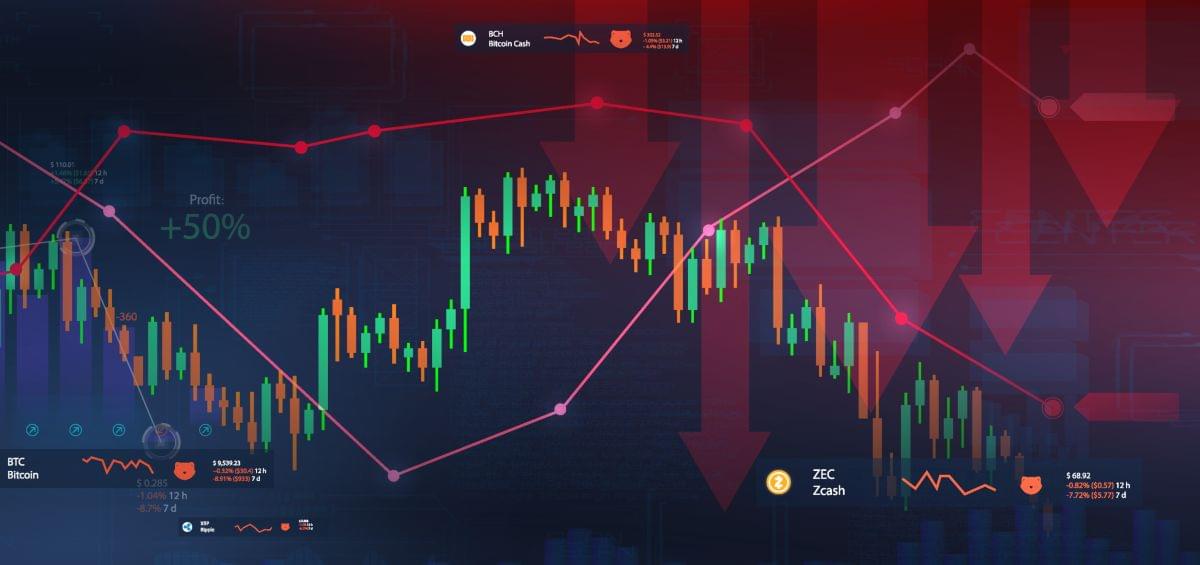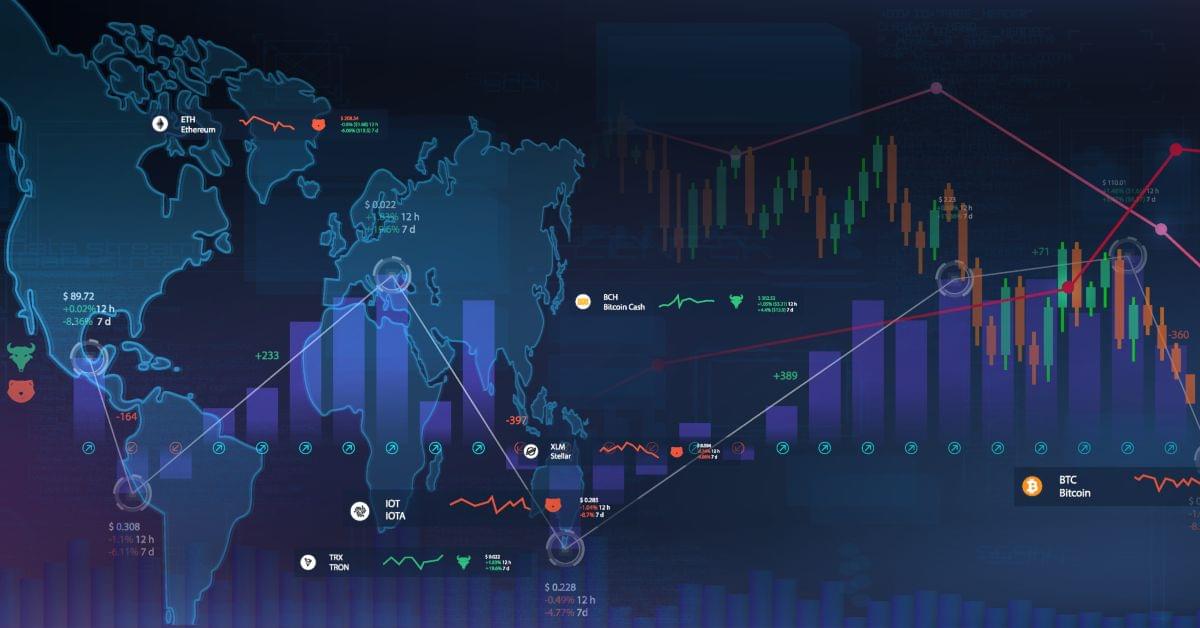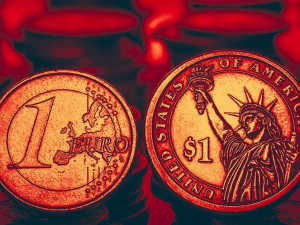
When it comes to business, it’s important for organisations that trade globally to have a keen understanding of currency volatility. Knowing what causes sudden or frequent fluctuations in exchange rates, and what the effects can be, will allow you to plan effectively and future-proof your business.
Here at CurrencyTransfer, we want to empower you to make the best decisions for your business and financial future. That’s why we’ve put together this overview of everything you need to know about currency volatility, so you can apply this knowledge to your business, investments, and more.

What is currency volatility?
Currency volatility occurs when there are rapid changes to the exchange rate of a currency pair in a short period of time. So, if the US Dollar began to rise and drop in value compared to Pound Sterling, this would be classed as currency pair volatility.
Although it’s normal for exchange rates to fluctuate, when the rate between two currencies is fluctuating much more than average, this is when economists and forex experts will take note.
Many international finance experts have their own metrics and formulae for determining currency pair volatility, however, there is no standardised way of measuring volatility. Most experts will analyse the exchange rate fluctuations across a set period, and compare this against historical data, and the average fluctuations across the currency market.
If the fluctuations are more frequent, or show very high increases and decreases in terms of the exchange rate, that particular currency pair will fit the description of currency pair volatility.
What is exchange rate volatility?
Exchange rate volatility can be interchangeably with both currency volatility, and forex volatility. However, they all refer to the same market phenomenon, which is frequent or severe fluctuations in the value of different currency pairs and the exchange rates between them.
What causes currency volatility?
Currency volatility, like normal fluctuations in exchange rates, can be caused by a number of different factors. These are three causes of currency volatility that we most commonly see.
1. Inflation
Inflation in a particular country is one of the most common causes of fluctuations in exchange rates. Shortages of things like fuel, labour, or raw materials can cause production to slow down, which means that prices for goods and services are likely to rise for consumers. This is known as Cost-pull inflation.
Demand-pull inflation can also have an effect on exchange rates. Demand-pull inflation occurs when high rates of purchasing and demand from consumers enables companies to sell their products for a higher price. Inflation can also be driven by changes to the housing market, changes to government policy and taxation, and a range of other things.
2. Demand: buying and selling
Trading within the forex market can also have an impact on exchange rates. When a particular currency comes into high demand among traders, there is less of that currency in circulation as traders purchase it en-masse.
When forex traders buy a currency at high enough rates, it can have an impact on those hoping to borrow money in that country. Interest rates of loans and mortgages may rise for local people, due to the value of the currency being driven up by trading. Therefore, although the currency itself is stronger on the global forex market, higher exchange rates can also affect the local population. We will cover this in more detail in the section ‘How does currency volatility affect people?’.
3. Political and economic conditions
Political and economic conditions can also have a considerable bearing on a currency’s exchange rate, and therefore its volatility.
For instance, political unrest or an unstable government are both likely to deter foreign investors from purchasing property or starting businesses in a particular region. This means fewer jobs are created, and the local economy will have fewer opportunities to thrive.
The same can be said for economic instability in a region. If sudden cost of living increases are causing residents to have less disposable income, businesses are unlikely to expand their operations into this region, as it would be a high-risk venture.
Economic collapse, or extreme economic phenomena like hyperinflation, can also have a startling effect on exchange rates, as it demonstrates how the value of a country’s currency can drop suddenly and dramatically. A recent case would be that of the Zimbabwean Dollar, which between 2006 and 2008 suffered crippling hyperinflation. In November 2008, a single US dollar was reportedly worth 669,000,000,000 Zimbabwean dollars.
This economic disaster was attributed to the government’s mismanagement of the country’s treasury, from printing additional money to pay loans, and then printing more to pay soldiers, police, and other civil servants.
Though this is a rare and extreme case, the government and economic stability of a country can each have a devastating effect on exchange rates, and in turn, currency volatility.

How does currency volatility affect businesses?
1. Selling
If you are a business that supplies products overseas, you may find your operations impacted by currency volatility – as well as your bottom line. If you are supplying goods or services to another country, and the value of their currency drops, you may find the payment you receive is now worth less than when you agreed your price with the buyer.
If they are paying you in your own currency, this won’t be an issue and the buyer will be the one impacted by the exchange rate fluctuation. However, if they are paying you in their local currency, your payment will now effectively be less once it is exchanged.
This is why it is vital to keep a close eye on exchange rate movements, and be ready to adjust your prices accordingly. Or, make sure you only accept payments in currencies which have proven to be more stable and not as volatile.
2. Buying
Exchange rate fluctuations can also affect business owners who import goods from other countries. When you agree a price with an international seller, in the period between this agreement and the payment of the invoice, the exchange rate may rise between your currency and theirs.
For instance, if you had agreed to purchase a shipment of wine from Italy for €75,000, the amount in Pound Sterling would currently be £62,250, based on an exchange rate of 1 EUR = 0.83 GBP. However, if the exchange rate shifted to 1 EUR = 0.85 GBP, you could find yourself paying an additional £1,500 (£63,750).
Although we can never predict exchange rate fluctuations, by looking at the history of a currency and comparing it to others on the market, we can determine how volatile that currency is. You can then apply this information to determine whether you are willing to accept the risk.
3. Supply and demand
As well as the up-front costs of importing and exporting, currency volatility can also affect businesses in terms of opportunity. The effects that currency volatility can have on buying and selling can harm, and even end, long-standing international business relationships.
When the risk is deemed too great to trade with a certain country due to the volatility of the currency they use, this can lead to organisations withdrawing their operations and investments. This also means that jobs and opportunities will disappear from these communities too.
When business owners are less willing to work with businesses from a certain country, it can lead to that country having a negative balance of trade, where their imports outweigh their exports. This is also known as a trade deficit, which can leave countries and communities economically vulnerable.
How does currency volatility affect people?
Currency volatility and exchange rates have a clear and measurable effect on the global economy, but there are a number of indirect consequences which can affect people, as well as businesses.
1. Prices of everyday goods
Whereas it’s common for businesses to feel the effects of currency volatility, these effects can often be felt at a personal level too. Imported goods, in particular, will frequently be subject to price rises when a country’s currency has suffered. This is due to businesses paying more for these goods – therefore, they must sell them at an increased cost to ensure they still turn a profit.
Many people tend to understand inflation in terms of the cost of everyday goods, like the price of a cup of coffee. However, higher prices in countries that rely on imported goods can mean that working people can see a marked rise in their general cost of living, with household bills and large expenses on the rise as well.
2. Employment
When businesses are faced with higher prices on imported goods, in order to maintain international trade relationships, they may choose to recoup those costs by making cuts to their workforce. People losing jobs in areas that have few big employers can cause a localised economic depression, with less disposable income meaning that the local economy will suffer.
Low rates of employment can affect all areas of the community, from young people looking to get on the career ladder, to older workers competing in the modern labour market. This creates a vicious circle with less money going into the local economy, meaning fewer jobs will be created to meet consumer demand.
3. Investments
Currency volatility can also have a devastating impact on things like investments. When a country’s currency becomes weaker, this means that many people’s liquid assets, such as pensions and long-term savings accounts, will now be worth less on the world stage.
For those saving to invest in properties or companies abroad, a drop in the exchange rate will now mean their investment pot is smaller. As a result, it may not meet the requirements for either a house deposit, or minimum investment in a company.
There is also a likelihood that they’ll be in competition with foreign investors, spurred on by the favourable exchange rate. Because a foreign currency will be worth more, it will be harder for local people to outbid investors from other countries, meaning that local people have fewer opportunities to invest within their own country.

Is currency volatility a good or bad thing?
It would be easy to view currency volatility as a purely negative phenomenon, but it isn’t as simple as that. Market fluctuation is unavoidable in all areas of business, from the value of stocks to consumer demand. In fact, there are even times when currency volatility can be of significant benefit.
When a country’s currency becomes weaker, they can gain a larger market share in terms of exports. Foreign buyers are likely to take advantage of the relatively low prices to buy more stock than they otherwise would, which can stimulate the country’s economy. As exchange rates level out, countries and international businesses can also benefit from the trade relations that were built during a time when the currency was weak.
Some economists have even suggested that currency volatility, on a long enough timeline, can be self-correcting. Foreign buyers taking advantage of low prices will increase a country’s exports, stimulating the economy and helping the value of the currency to increase – perhaps to a better position than before.
There are certainly clear downsides to currency volatility, as a stable currency can make it easier for businesses to plan, both in the short and long-term. However, exchange rate fluctuations can be an incentive for buyers to seek out overseas suppliers, meaning that the international trade market is driven, in part, by these exchange rate fluctuations.
As long as international businesses seek out the best possible prices for goods and services, trade relations and global business deals will continue to be made, which benefits the global community.
How COVID-19 has affected currency volatility
One of the most impactful events of the last 50 years, the COVID-19 pandemic, had a significant effect on the global currency market. With worldwide worker shortages, national lockdowns, and a global import and export crisis, it’s no wonder that such a precarious situation had a knock-on effect when it came to the exchange rates of many countries.
An examination by PwC showed that Pound Sterling suffered a 15% fall compared to the US Dollar. In the early days of the pandemic, the Chinese Yuan also suffered losses against the US Dollar, becoming much weaker in the global market.
Although there can be many reasons for a drop in the value of a currency, we already know that socio-political factors can have an effect. Because the COVID-19 virus was first discovered in the Wuhan region of China, the people of this region were some of the first to face stringent safety measures and lockdowns. This could mean that they also suffered the ill effects to their national currency ahead of many other countries.
As restrictions have eased, currency volatility for many countries has slowed and began to even out as international trade of both imports and exports has become more reliable.
How can I protect myself against currency volatility?
Although exchange rate fluctuations and currency volatility are inevitable, and difficult to predict based on past trends, that doesn’t mean that there’s nothing you can do as a business owner to protect yourself from sudden drops.
A robust hedging or financial risk management strategy can go some way to reducing the effects of exchange rate volatility on your business. And maintaining a diverse portfolio of more than one currency will mean you are less vulnerable to sudden drops in a single currency.
Although past trends cannot accurately predict the future stability of a currency, if you are given the choice between a stable and volatile currency, carefully consider where you’d like to invest your money. Higher-risk strategies can certainly prove rewarding, but make sure that your portfolio or business could survive a negative result in case of further movements in exchange rates.
You can also visit our site to see the range of services that we offer which will help you to protect your bottom line. From our free exchange rate alert service, to risk management tools like market orders and forward contracts to lock in the best rates, we have a wide range of solutions available to help you succeed.
Currency volatility: final thoughts
Currency volatility may be a fact of life, but here at CurrencyTransfer, we support you in all other aspects of your business. With our quick, hassle-free international money transfer service, you can pay your invoices in confidence, while keeping on top of exchange rate fluctuations.
With our specialised service for businesses, importers and exporters can manage risk more effectively. Once you open an account with us, you also get your personal currency concierge, only a call away, to help you with your unique currency transfer requirements.
To learn more about our world-class money transfer service, feel free to visit our About page, or browse our list of supported currencies. And if you’d like more expert advice on managing your finances or building your international business plan, we have a range of articles available at our dedicated CurrencyTransfer blog.
Florence Couëdel
Editor



